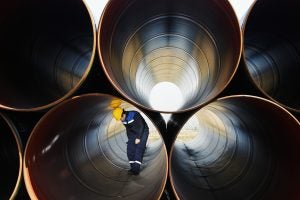Methane: Europe’s missing link for effective energy decarbonization
The EU Sector Integration Strategy, expected in June, has become the top energy policy issue this year, and it will define the role of gas in Europe’s current and future transitions.
In recent weeks, there have been increasing calls for Europe’s gas decarbonization to focus on hydrogen and renewable gases, while saying very little — if anything — about energy-related methane emissions. Yet according to the Intergovernmental Panel on Climate Change, reducing methane is a critical complement to reducing carbon dioxide emissions if we are to reach our greenhouse gas reduction goals and stabilize the climate.
The commission’s plan thus far seems to be taking a cross-sector approach in addressing methane emissions across energy, agriculture and waste. It is sensible, given that human-made methane emissions from oil and gas, agriculture and other sources are responsible for over a quarter of the warming our planet is experiencing now.
With the sector integration and gas market reform fast approaching, EDF believes that the EU has a unique opportunity to take the lead by mandating a methane performance standard of 0.2% by 2025 on all gases used in the EU. Without addressing this key issue, sectoral integration would neglect arguably the most impactful step it could take to deal with emissions in the energy system today.
Considering the stated purpose of the sector integration is achieving the net-zero vision, the most important fact to know is that when reverse engineering from 2040, 50% of the warming caused by greenhouse gas emissions in 2020 will come from anthropogenic methane. In other words, the impact of GHGs emitted this year over the next 20 years will be dominated by methane.
Methane: Europe’s missing link for effective energy decarbonization Share on XRoughly, one-third of that total (or about 12% of the warming in 2040) will come from oil and gas methane emissions, a sector with proven, cost-effective technologies that can scale quickly to slash methane emissions. According to the International Energy Agency, fixing this problem is the highest-value, lowest-cost greenhouse gas reduction strategy available in the global energy industry today, and the EU has a critical part to play in harvesting its full potential.
About half of all internationally traded gas is consumed by Europe. The EU sources its gas from countries like Russia, the U.S. and Algeria, countries with sizeable methane emissions. This provides the EU with significant leverage when it comes to tackling emissions from the upstream segment, which is where the biggest part of the methane problem lies.
Many key stakeholders have already come to understand the importance of a regulated methane performance standard underpinned by robust, science-based assurance. This includes European investors under the Institutional Investors Group on Climate Change umbrella that manage €30 trillion in assets and climate activists like CAN Europe and EDF. Even leading European oil and gas companies like Shell, have come out in support of EU methane regulations.
Simply put, the EU can’t afford to be any less ambitious than literally every stakeholder segment urging action.
Momentum is building and the commission must now respond, to show how it will embrace its obligation to curtail these emissions in the energy system today, while building the businesses of tomorrow that will support a green economy.
If we manage methane, as part of Europe’s economic recovery, then we have an exciting opportunity to generate modern, well-paid jobs. More will follow if the EU focuses on creating an efficient market for both methane and CO2 mitigation solutions. The EU should not miss this opportunity to support these industries of tomorrow.
EDF stands ready to help with both scientific capacity to improve the accuracy of measurements as well as through our subsidiary, MethaneSAT, and our global network of partners to help develop and implement EU energy and methane policies that work.











